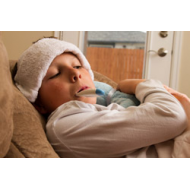It's that time of the year again when everyone around you seems to be getting sick. Follow our tips to protect yourself from the common cold!
Common colds are the main reason that children miss school and adults miss work. Each year in the United States, there are millions of cases of the common cold. Adults have an average of two to three colds per year, and children have even more.
Most people get colds in the winter and spring, but it is possible to get a cold any time of the year. Symptoms usually include sore throat, runny nose, coughing, sneezing, watery eyes, headaches, and body aches. Most people feel better in about seven to ten days. However, people with weak immune systems, ashthma, or respiratory conditions may develop a more serious illness, such as pneumonia.
How to Protect Yourself and Others
- Wash your hands often with soap and water. Wash them for 20 seconds and help young children do the same. If soap and water are not available, use an alcohol-based hand sanitizer. Viruses that cause colds can live on your hands and regular handwashing can help protect you from getting sick.
- Avoid touching your eyes, nose, and mouth with unwashed hands. Viruses that cause colds can enter your body this way and make you sick.
- Stay away from people who are sick. Sick people can spread viruses that cause the common cold thorugh close contact with others.
If you have a cold, you should follow these tips to prevent spreading it to other people:
- Stay at home while you are sick.
- Avoid close contact with others, such as hugging, kissing, or shaking hands.
- Move away from people before coughing or sneezing.
- Cough and sneeze into a tissue then throw it away, or cough and sneeze into your upper shirt sleeve, completely covering your mouth and nose.
- Wash your hands after coughing, sneezing, or blowing your nose.
- Clean frequently touched surfaces and objects, such as toys and doorknobs.
There is no cure for a cold, but you should feel better by getting lots of rest and drinking plenty of fluids. Over-the-counter medicines may help ease symptoms, but will not make your cold go away any faster. Antibiotics will also not help you recover from a cold because they do not work against viruses.
You should call a doctor if you or your child has one or more of these conditions:
- a temperature higher than 100.4°F
- symptoms that last more than 10 days
- symptoms that are severe or unusual
For more information, visit the CDC website.

